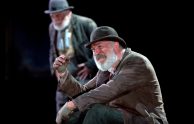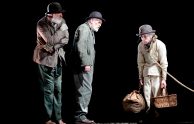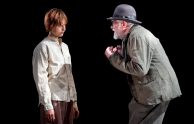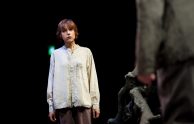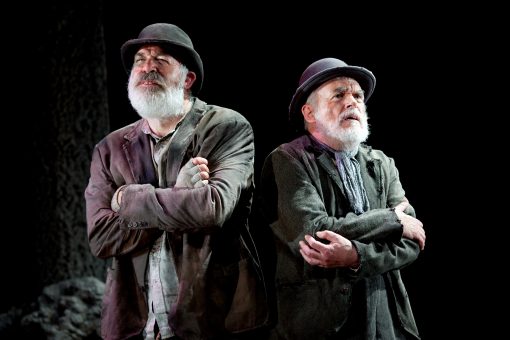
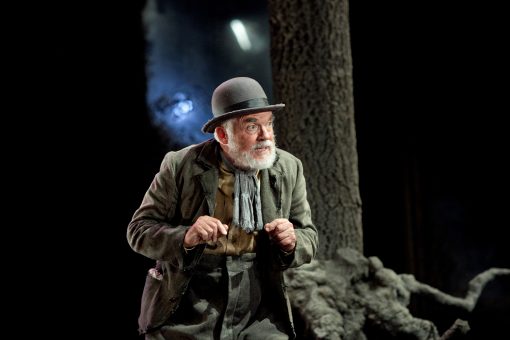
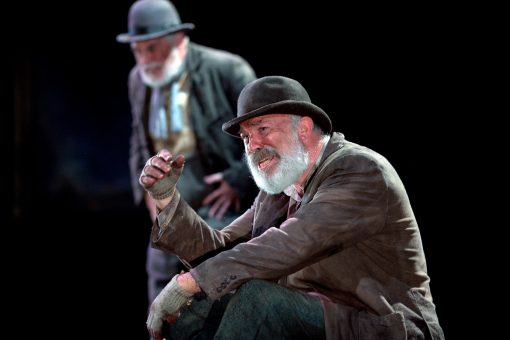
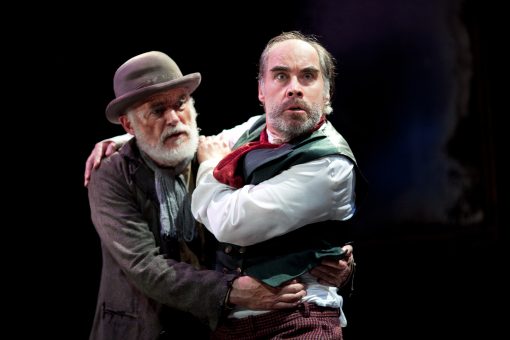
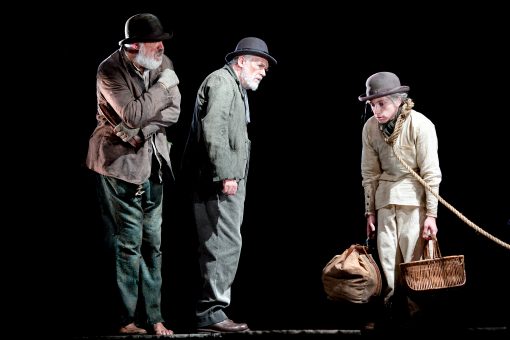
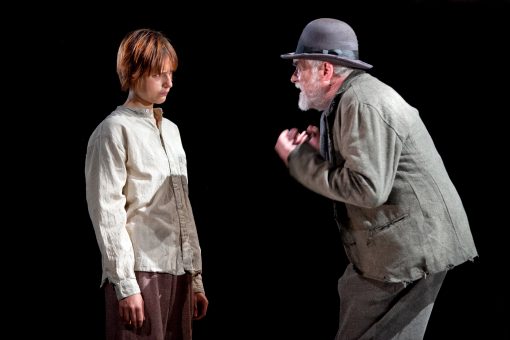
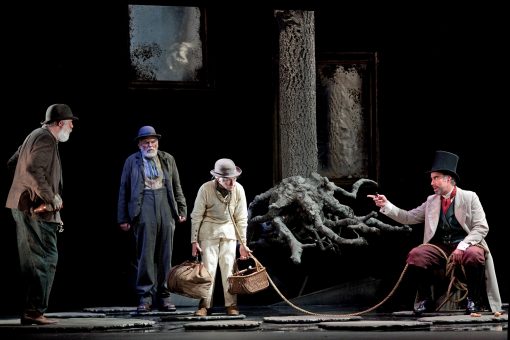

"The set is cold and stark; with blasted trees, some suspended overhead. This is at once nowhere and everywhere; it is about all of us. Vladimir (Peter Cadden) and Estragon (Richard Heap), the two tramps waiting in vain for Godot to turn up, are intentionally comic and tragic. With their touching platonic bond and, more explicitly, their hat-swapping routine they’re like Laurel and Hardy. Cadden, with his kidney trouble and cultured speech, and Heap, who has problems with his boots and a deep and rough voice, deliver stunning performances. They cope with some of the most difficult lines in drama brilliantly. Michael Keane is excellent as the white-faced boy-servant Lucky. He generates applause with his incredible monologue. Jonathan Ashley too is splendid as the grotesquely reactionary Pozzo, who in the second half is blind. There’s also a fine performance from Sonja Zobel as A Boy, a sprite-like figure who claims to be a messenger from Godot and who may or may not be imagined."
Alan Geary - Nottingham Post
"The relationship between the tramps provides the play with its pulse. Like the best comedy double acts, it collides opposites: Vladimir (Peter Cadden) is reflective and refined while Estragon (Richard Heap) is impulsive and blunt. This London Classic Theatre production effectively amplifies the disparity: Vladimir’s cut-glass Oxford pronunciation bristles against Estragon’s working class Mancunian. Through their empathetic, precise playing, the actors achieve a sustained chemistry, evoking a compelling relationship that veers from that of stranded children to bickering old couple, swirling from dependence to desperation. Central to this desperation is Vladimir and Estragon’s sense of claustrophobia, and this is enhanced here through striking set design. Exploding Beckett’s austere set directions, the stage is adorned with huge oak trees, extravagant but shabby mirrors, and a path of driftwood stepping stones. As this intricate path underscores the characters’ isolation (serving as little islands in a post-apocalyptic landscape) and conjures the impression of a giant chessboard, it also tees up arresting visuals, particularly during Lucky and Pozzo’s entrance as they skip across the stones in perfect unison. Casting the diminutive Michael Keane as the abject Lucky is an inspired choice as it heightens our innate sympathy for the character, while Jonathan Ashley portrays the pompous Pozzo as foghorn-loud, convincingly delivering a performance within a performance. Director Michael Cabot stylishly mines a script where “blathering about nothing in particular” forms the touchstone. Expertly weaving the play’s vaudevillian antics with its existentialist angst, this exhilarating production is as attuned to Beckett’s slapstick humour as it is his devastating bleakness."
Brendan Daly - Sunday Business Post
"It’s a play in which nothing happens, but still keeps audiences glued to their seats. But it’s how it happens that matters; and at last night’s premiere performance at Shrewsbury’s Theatre Severn, London Classic Theatre got it spot on. It was a hypnotically meditative evening."
Chris Eldon Lee - Whats On Shropshire
CREATIVE TEAM:
Playwright: Samuel Beckett
Directed by Michael Cabot
Designed by Bek Palmer
Lighting by Andy Grange
Costume Supervisor: Saeni Greene
Photography: Sheila Burnett
CAST: Jonathan Ashley, Peter Cadden, Richard Heap, Michael Keane, Sonja Zobel.
SELECTED VENUES: Theatre Severn Shrewsbury, Oldham Coliseum, New Vic Theatre, Newcastle-under-Lyme, Theatre Royal Bury St Edmunds, Harlow Playhouse, Civic Theatre, Chelmsford.
THE SHOW:
A country road. A tree. Evening. Vladimir and Estragon meet as dusk approaches. Estragon tries to remove his boot. Vladimir examines his hat. A conversation begins, a joke is interrupted. A carrot is eaten. The two men quarrel, then embrace. A pair of eccentric travellers arrive. Seemingly master and servant, one stands weighed down at the end of a long rope, the other carries a whip.
So begins Samuel Beckett’s 60-year-old masterpiece Waiting for Godot, a ground-breaking, anarchic meditation on the meaning of life and death. Part allegory, part burlesque, Beckett’s unique, timeless play moves seamlessly between absurdist comic sketch and captivating philosophical drama.
Waiting for Godot was first produced in the UK at the Arts Theatre, London in 1955, directed by Sir Peter Hall. In 1999, it was voted the most significant English language play of the 20th Century.
The Production Office, 69 Whyteleafe Hill, Whyteleafe, Surrey CR3 0AJ | 020 8402 7501 |
Copyright 1993-2026. Built by Pelinor.



